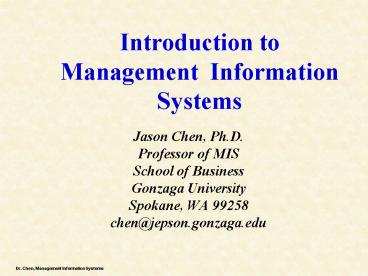Introduction to Management Information Systems - PowerPoint PPT Presentation
1 / 27
Title:
Introduction to Management Information Systems
Description:
The bad news: They generate 300% more work. Dr. Chen, Management Information Systems ... those that exploit Information Technology (IT) those that are out of business ... – PowerPoint PPT presentation
Number of Views:2110
Avg rating:3.0/5.0
Title: Introduction to Management Information Systems
1
Introduction to Management Information Systems
- Jason Chen, Ph.D.
- Professor of MIS
- School of Business
- Gonzaga University
- Spokane, WA 99258
- chen_at_jepson.gonzaga.edu
2
Why Information Systems(Why BMIS235)?
- In the tumultuous last years of the 20th
century, when _______ was the only certainty and,
one after another, fierce new competitors rose up
from every corner of the globe to vie for
dominance of the world marketplace, enterprise
organizations came to understand that their only
hope for survival lay with _______________________
__________________ And they called out to their
IT managers to instruct them in the ways of IT
and to fashion IT into a brave, finely-honed
competitive advantage with which to vanquish
their enemies ...
change
Information Systems/Information Technology (IS/IT)
N
3
Is Computer Age Over ?
4
The Information Age vs. the Computer Age
The Computer Age Time-sharing
Computer 1960s
End of the computer age
Beginning of the information age
5
Computer Age vs. Information Age
- Computer age refers to the love affair with
hardware (and its speed of processing data) - Information age refers to the trend toward
treating information as a corporate resource that
supplies executives with timely, accurate
information for more effective decision making.
6
Computers Impact
The good news
Computers allow us to work 100 faster.
The bad news
They generate 300 more work.
7
What is Information ?
- DATA
INFORMATION
Information is refined data.
8
More Information ?
- More information is not profitable unless it is
relevant information. - Executives will need better information in the
future if their companies are to be competitive.
9
Information
- BAD information is WORSE than ...
NO information.
10
Attributes of Information Quality
- We realize that a firm needs better information
to survive and prosper. Therefore, high quality
information products have to be provided to
management.
11
Attributes of Information Quality
Should "timely" information be up-to-the-second?
Timeliness Currency Frequency Time Period
Timeliness Currency Frequency Time Period
Time Dimension
Accuracy Relevance Completeness Conciseness Scope
performance
Clarity Detail Order Presentation Media
Accuracy Relevance Completeness Conciseness Scope
performance
Form Dimension
Clarity Detail Order Presentation Media
Content Dimension
12
SYSTEM
INPUT
OUTPUT
PROCESS
FEEDBACK
TM -12
Dr. Chen, Information Age
13
System Concepts
Environment
Control by Management
Feedback Signals
Feedback Signals
Control Signals
Control Signals
Input of Raw Materials
Output of Finished Products
Manufacturing Process
System Boundary
Other Systems
14
100 Years ago...
- Industrial Revolution changed the World
Today...
- Information
- Revolution!
15
Industry Evolution (mid 1770s)
Rail Road (1829, change concept of distance)
Impact on Economy, Politics, Social change
Internet
________ (1990, ??? Distance)
_________
Computer
Information Evolution (late 1990s)
N
16
100 Years ago...
- Industrial Revolution changed the World
Today...
- Information
- Revolution!
17
Information and our Life
- Information (and energy) are at the core of
everything around us. - Our entire existence is a process of gathering,
analyzing, understanding, and acting on the
information.
18
What is IS/MIS ?IS IT ?
19
INFORMATION SYSTEMS (MIS/IS)
ORGANIZATIONS
TECHNOLOGY
MANAGEMENT
TM -19
Dr. Chen, The Challenge of the Information
Systems Technology
20
What is Information Systems?
- Information Systems (IS) are more than computer
hardware and software. - It is not just developing business applications
programs - Information Systems include
- Information Technology
- Management
- Organization
- Ultimately, IS are used as strategic tool to
improve an organizations competitive advantage.
21
To facilitate managers in
- Day-to-day operations
- Data Processing
- Decision Making
22
What is Technology?
If it's green, it's biology,
if it stinks, its chemistry,
if it has numbers its math,
if it doesn't work,
its technology
23
Objectives of the MIS
- Deliver the right information
- to the right people,
- at the right time,
- with the right form.
- Ultimately, MIS should improve the workers
productivity.
- who has what information about whom and when,
where, and how will all be decided in the process
of building an information system.
24
What is the class about ?
- Therefore, this class is about the need,
- the value, and
- the means
- of acquiring, creating, and using the
information in the information age.
25
The Twenty-first Century will ...
- The twenty-first century will witness only two
kinds of companies - those that exploit Information Technology (IT)
- those that are out of business
Source Quality Information and Knowledge, Huang
et. al., Prentice Hall
26
CONCLUSION
- Information System (IS) should be an
organizational and management solution, based on
information technology (IT), to a challenge posed
by the environment.
27
THE INFORMATION SYSTEMS REVOLUTION
TRANSFORMING BUSINESS MANAGEMENT
TM -27































